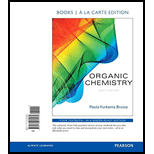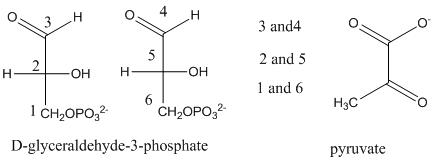
Concept explainers
(a)
Interpretation:
The labeled carbon in pyruvate should be determined when it is comes from
Glycolysis cycle:
In the carbohydrate
Glycolysis cycle. In this cycle, the glucose is converted into D-glyceraldehye-3-phosphate and this D-glyceraldehye-3-phosphate is further converted into pyruvate,
In this process, the carbons

(b)
Interpretation:
The labeled carbon in pyruvate should be determined when it is comes from
Glycolysis cycle:
In the carbohydrate metabolism, the conversion of glucose into pyruvate is known as
Glycolysis cycle. In this cycle the glucose converted into D-glyceraldehye-3-phosphate and this D-glyceraldehye-3-phosphate is further converted into pyruvate,
In this process, the carbons atoms numbered in the order of where it is in glucose,

(c)
Interpretation:
The labeled carbon in pyruvate should be determined when it is comes from
Glycolysis cycle:
In the carbohydrate metabolism, the conversion of glucose into pyruvate is known as
Glycolysis cycle. In this cycle the glucose converted into D-glyceraldehye-3-phosphate and this D-glyceraldehye-3-phosphate is further converted into pyruvate,
In this process, the carbons atoms numbered in the order of where it is in glucose,

(d)
Interpretation:
The labeled carbon in pyruvate should be determined when it is comes from
Glycolysis cycle:
In the carbohydrate metabolism, the conversion of glucose into pyruvate is known as
Glycolysis cycle. In this cycle the glucose converted into D-glyceraldehye-3-phosphate and this D-glyceraldehye-3-phosphate is further converted into pyruvate,
In this process, the carbons atoms numbered in the order of where it is in glucose,

(e)
Interpretation:
The labeled carbon in pyruvate should be determined when it is comes from
Glycolysis cycle:
In the carbohydrate metabolism, the conversion of glucose into pyruvate is known as
Glycolysis cycle. In this cycle the glucose converted into D-glyceraldehye-3-phosphate and this D-glyceraldehye-3-phosphate is further converted into pyruvate,
In this process, the carbons atoms numbered in the order of where it is in glucose,

(f)
Interpretation:
The labeled carbon in pyruvate should be determined when it is comes from
Glycolysis cycle:
In the carbohydrate metabolism, the conversion of glucose into pyruvate is known as
Glycolysis cycle. In this cycle the glucose converted into D-glyceraldehye-3-phosphate and this D-glyceraldehye-3-phosphate is further converted into pyruvate,
In this process, the carbons atoms numbered in the order of where it is in glucose,

Want to see the full answer?
Check out a sample textbook solution
Chapter 24 Solutions
Organic Chemistry, Books a la Carte Edition (8th Edition)
- Draw the major product of this reaction. Ignore inorganic byproducts and the carboxylic acid side product. O 1. CHзMgBr (excess) 2. H₂O ✓ W X 人arrow_forwardIf cyclopentyl acetaldehyde reacts with NaOH, state the product (formula).arrow_forwardDraw the major product of this reaction. Ignore inorganic byproducts. N S S HgCl2, H2SO4 く 8 W X Parrow_forward
- tab esc く Drawing the After running various experiments, you determine that the mechanism for the following reaction occurs in a step-wise fashion. Br + OH + Using this information, draw the correct mechanism in the space below. 1 Explanation Check F2 F1 @2 Q W A os lock control option T S # 3 80 F3 Br $ 4 0105 % OH2 + Br Add/Remove step X C F5 F6 6 R E T Y 29 & 7 F D G H Click and drag to start drawing a structure. © 2025 McGraw Hill LLC. All Rights Reserved. Terms of Use | Privacy Ce A F7 DII F8 C Ո 8 * 9 4 F10 F C J K L C V Z X B N M H command P ge Coarrow_forwardIndicate compound A that must react with ethylbenzene to obtain 4-ethylbenzene-1-sulfonic acid. 3-bromo-4-ethylbenzene-1-sulfonic acid.arrow_forwardPart 1 of 2 Draw the structure of A, the minor E1 product of the reaction. esc I Skip Part Check H₂O, D 2 A + Click and drag to start drawing a structure. -0- F1 F2 1 2 # 3 Q A 80 F3 W E S D F4 $ 4 % 5 F5 ㅇ F6 R T Y F G X 5 & 7 + Save 2025 McGraw Hill LLC. All Rights Reserved. DII F7 F8 H * C 80 J Z X C V B N 4 F9 6arrow_forward
- File Preview The following is a total synthesis of the pheromone of the western pine beetle. Such syntheses are interesting both because of the organic chemistry, and because of the possibility of using species specific insecticides, rather than broad band insecticides. Provide the reagents for each step. There is some chemistry from our most recent chapter in this synthesis, but other steps are review from earlier chapters. (8 points) COOEt COOEt A C COOEt COOEt COOH B OH OTS CN D E See the last homework set F for assistance on this one. H+, H₂O G OH OH The last step is just nucleophilic addition reactions, taking the ketone to an acetal, intramolecularly. But it is hard to visualize the three dimensional shape as it occurs. Frontalin, pheromone of the western pine beetlearrow_forwardFor the reaction below: 1. Draw all reasonable elimination products to the right of the arrow. 2. In the box below the reaction, redraw any product you expect to be a major product. C Major Product: Check + ◎ + X ง © Cl I F2 80 F3 I σ F4 I F5 NaOH Click and drawing F6 A 2025 McGraw Hill LLC. All Rights E F7 F8 $ # % & 2 3 4 5 6 7 8 Q W E R T Y U A S D F G H Jarrow_forwardCan I please get help with this graph. If you can show exactly where it needs to pass through.arrow_forward
- N Draw the major product of this reaction. Ignore inorganic byproducts. D 1. H₂O, pyridine 2. neutralizing work-up V P W X DE CO e C Larrow_forwardDraw the major product of this reaction. Ignore inorganic byproducts. N O' 1. H2O, pyridine 2. neutralizing work-up く 8 W aarrow_forwardIdeal Gas Law Practice Name If you need a refresher on Ideal Gas Law, go back to your Ideal Gas Law Reading Assignment from last week! On all of the following, you'll need to make sure to convert pressures to atm and convert temperatures to Kelvin in order to be able to use the R gas constant on your equation sheet! Given: Ideal Gas Law = then P= pressure V = volume R= ideal gas consent PV=nRT namount of substance n=PV/TR P=nRT/V I = temperature V=nRT/P T=PV/nR R=PV/nT 1. What pressure is required to contain 0.023 moles of nitrogen gas in a 4.2 L container at a temperature of 20.°C? 2. Oxygen gas is collected at a pressure of 123 kPa in a container which has a volume of 10.0 L. What temperature must be maintained on 0.500 moles of this gas in order to maintain this pressure? Express the temperature in degrees Celsius. 3. How many moles of chlorine gas would occupy a volume of 35.5 L at a pressure of 100.0 kPa and a temperature of 100. °C? After determining the number of moles,…arrow_forward
 Chemistry for Today: General, Organic, and Bioche...ChemistryISBN:9781305960060Author:Spencer L. Seager, Michael R. Slabaugh, Maren S. HansenPublisher:Cengage Learning
Chemistry for Today: General, Organic, and Bioche...ChemistryISBN:9781305960060Author:Spencer L. Seager, Michael R. Slabaugh, Maren S. HansenPublisher:Cengage Learning General, Organic, and Biological ChemistryChemistryISBN:9781285853918Author:H. Stephen StokerPublisher:Cengage Learning
General, Organic, and Biological ChemistryChemistryISBN:9781285853918Author:H. Stephen StokerPublisher:Cengage Learning Organic And Biological ChemistryChemistryISBN:9781305081079Author:STOKER, H. Stephen (howard Stephen)Publisher:Cengage Learning,
Organic And Biological ChemistryChemistryISBN:9781305081079Author:STOKER, H. Stephen (howard Stephen)Publisher:Cengage Learning, Introduction to General, Organic and BiochemistryChemistryISBN:9781285869759Author:Frederick A. Bettelheim, William H. Brown, Mary K. Campbell, Shawn O. Farrell, Omar TorresPublisher:Cengage Learning
Introduction to General, Organic and BiochemistryChemistryISBN:9781285869759Author:Frederick A. Bettelheim, William H. Brown, Mary K. Campbell, Shawn O. Farrell, Omar TorresPublisher:Cengage Learning
 Chemistry In FocusChemistryISBN:9781305084476Author:Tro, Nivaldo J., Neu, Don.Publisher:Cengage Learning
Chemistry In FocusChemistryISBN:9781305084476Author:Tro, Nivaldo J., Neu, Don.Publisher:Cengage Learning





